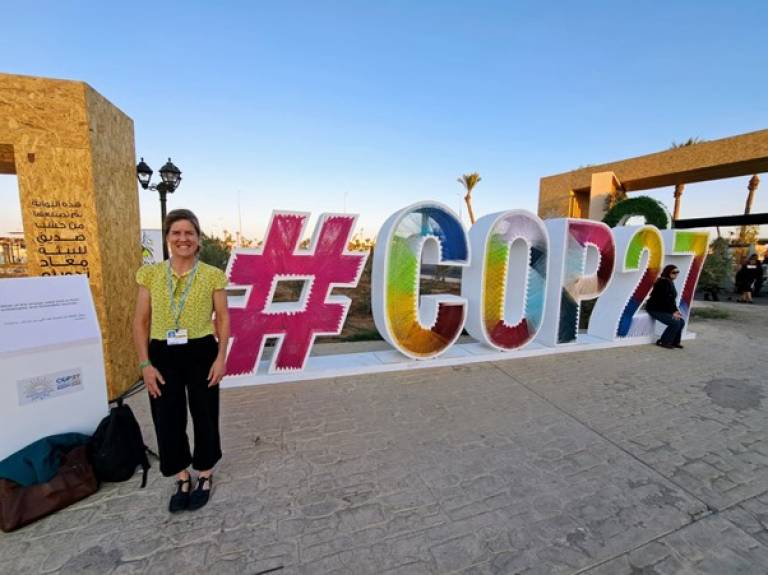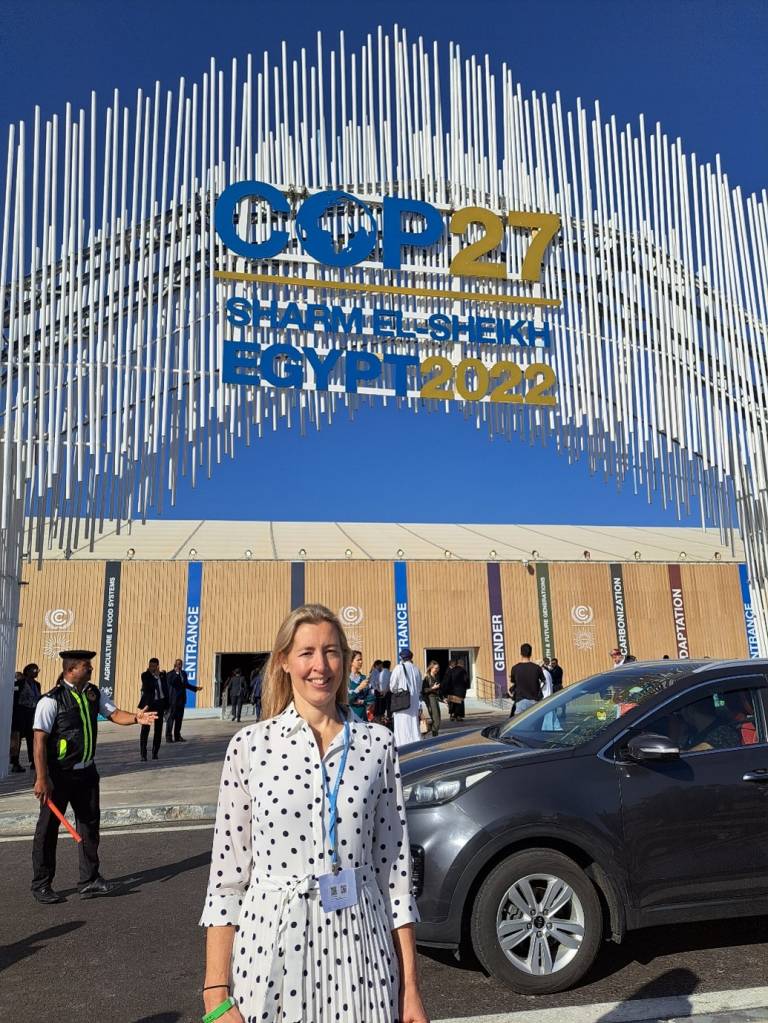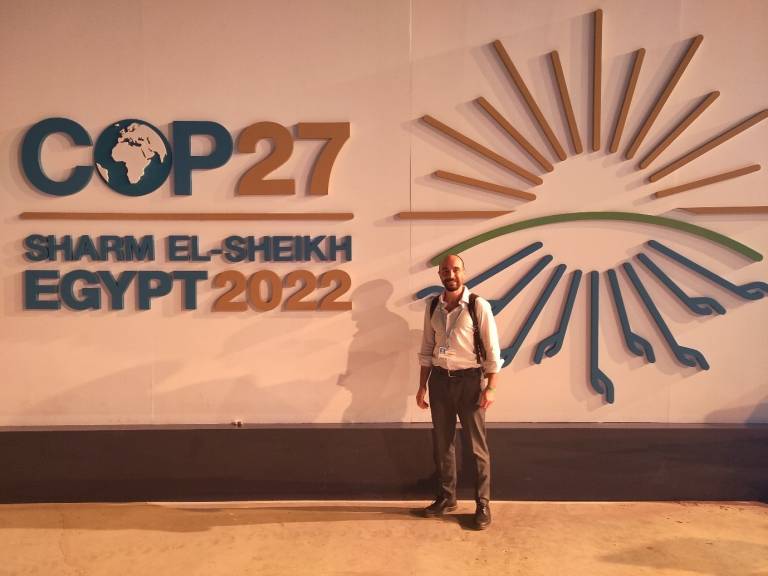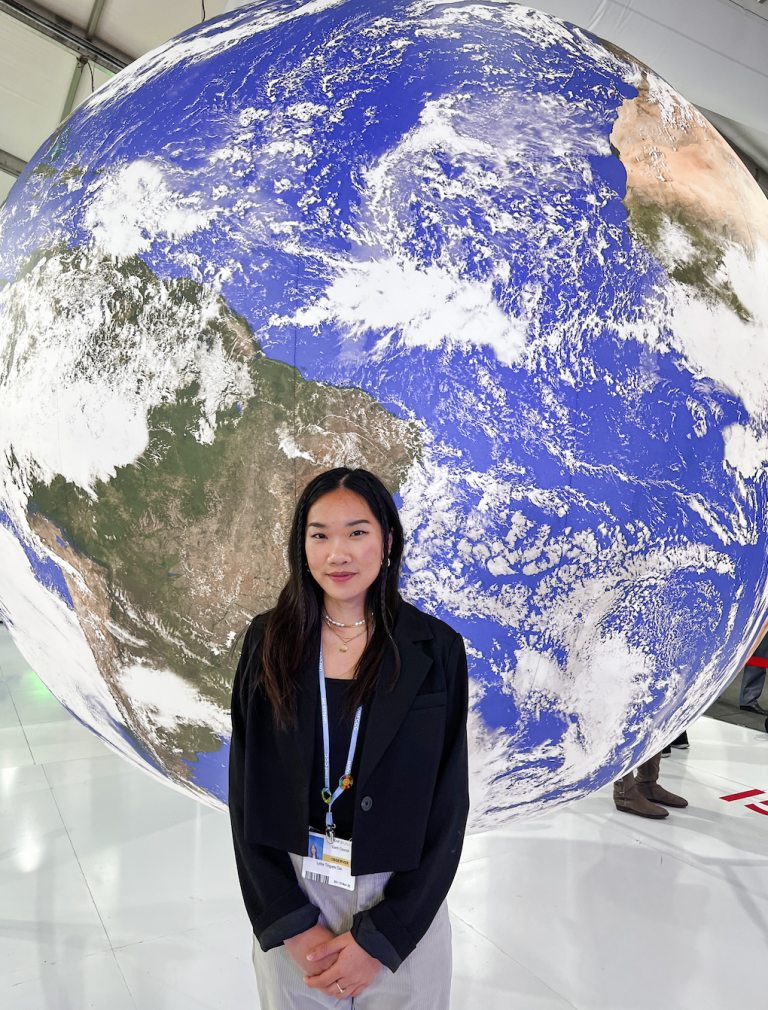With week one at COP27 concluding we have spoken to some of our UCL colleagues attending the Climate Conference in Sharm El-Sheikh to hear more about their experiences
Dr Kate Greer is a Research Fellow in the Centre for Climate Change and Sustainability Education (CCCSE) who’s research in climate change education has a particular focus on policy influence: who are the influencers, how do they wield influence, and what are the factors that keep climate change education on the margins of policy. Attending COP27 enabled Kate to continue research into the nature of climate change education policy in an international forum through following the negotiations and interviewing negotiators and advocates involved in Action for Climate Empowerment (ACE). This area of the negotiations brings together articles of the Paris Agreement and the United Nations Framework Convention on Climate Change that focus on Education, Training, Public Participation, Public Access to Information, Public Awareness and International Cooperation.
“Going to COP is like riding a rollercoaster of emotions: heart-warming and heart-breaking; motivating and despairing; frustrating and empowering. A week at COP leaves me holding fear and hope in my hands at the same time. Although it is easy to be a critic – and much to be critical of – the annual UN climate change conference propels action all around the globe. I like to think that it propels more action than might otherwise occur – and that counts for something”. Dr Kate Greer, Centre for Climate Change and Sustainability Education.

What has been the highlight of Week One?
The most compelling moments (more so than highlights) of my week came from listening to stories of how climate change is impacting communities right now. In the UK Pavilion, I listened to Kenyan Environmentalist and Climate Activist, Elizabeth Wathuti, as she described the devastating effect of drought on children’s schooling. In the Australian Pavilion, the Indigenous People’s Organisation of Australia shared how indigenous cultural heritage continues to be threatened because of mining that is supporting the renewable energy boom. Whilst these stories are distressing to hear, COP is an important occasion to shine the spotlight on them. These stories remind me why climate change education goes beyond learning about science is so important in wealthy, high carbon emitting countries like the UK and Australia. It is countries like ours that carry enormous responsibility for the historical and continuing causes of climate change, and solutions, and our actions continue to impact vulnerable people, communities, and cultures. Our citizens, young and old, need to be aware of these impacts so that they might be prompted to contribute to a societal transformation that cares for and seeks to support the most vulnerable.
What are the main findings you have gathered from COP so far?
Although I am yet to analyse my research data one key reflection from my time at COP27 relates to the importance of researchers engaging with policymakers who are involved in international processes all year round. The negotiations are complex diplomatic processes, and the conference environment is frenetic; it is difficult to engage with complex content during the COP. However, researchers can better support policymakers by building relationships and be sharing knowledge throughout the year.
How will you incorporate your COP experience into your research/work moving forward?
Ultimately, my research seeks to support those who influence policy – be that policymakers or political actors – to step up to influence for quality climate change education. It will illuminate factors that hamper policy progress thereby revealing pathways for more effective policy and practice.
Professor Nicola Walshe is Executive Director of the UCL Centre for Climate Change and Sustainability Education (CCCSE) and leads a research group with internationally significant and sustained expertise in climate change and sustainability education. Ongoing work includes research exploring climate change and sustainability education across whole-school eco-systems, and a UK-wide survey to measure teachers’ attitudes, understanding and competency relating to teaching climate change and sustainability. Nicola’s own personal research expertise is predominantly around curricula and pedagogies for climate change and sustainability education (what is taught and how). I have recently led two AHRC-funded projects, Eco-Capabilities and Branching Out, which explore the processes by which arts-in-nature practice supports children’s connection with the environment and, thereby, their wellbeing.
The UCL CCCSE represents a significant commitment by UCL to ensuring the highest quality climate change and sustainability education for all children and young people. It has rapidly established international significance and developed effective partnerships, including with schools, HEIs, NGOs and government bodies. Nicola’s motivation for attending COP27 was to enable the Centre to enhance its international knowledge exchange and policy engagement activity in the space of climate change and sustainability education. Further, I wanted to support the international effort to ensure education remains at the forefront of discussions around climate change, and is a key pillar of COP28.
“It has been an absolute pleasure to be a member of the UCL delegation to COP27. Being at COP is simultaneously inspirational, energising, frustrating (at times!) and physically and emotionally exhausting, but experiencing these emotions alongside wonderful colleagues who are equally deeply committed to ensuring we make progress against climate change is an absolute privilege” Professor Nicola Walshe, Executive Director of the UCL Centre for Climate Change and Sustainability Education

What has been the highlight of week one?
One of my main priorities during COP27 was to follow Action for Climate Empowerment (ACE) negotiations through which focal points were finalising a four-year action plan for ACE. This is crucial for supporting countries to develop work around climate change education and public participation (among other things) so is a vital element of addressing climate change at a global scale. There was a deadline for agreement of 6pm on the middle Friday, and lack of consensus around text relating to human rights and finance meant reaching this seemed highly unlikely with only minutes to go. However, the huge effort and commitment to a resolution by all parties led to an agreement at the final hour (in the last few seconds!). The sheer relief and utter elation of this achievement will stay with me for a long time; seeing the delight on the faces of parties illustrated how important this was – a real illustration of what we can achieve when working together.
Beyond this critical event, the week was full of perhaps less formal but equally impactful (on me) highlights. For example, one of the most inspirational moments was attending a session entitled Climate Change, Environmental Management and Self-Determination: Aboriginal Perspectives from Australia. Within this, first nation leaders clearly and passionately spoke about the disproportionate impact of climate change and environmental degradation on first nation land and people, and the imperative to include first nation people in adaptation and mitigation responses (including developing clean energy). It was a clear reminder to me of the need for climate change education to go far beyond just the science to prioritise climate justice as part of an holistic approach to education. This is absolutely central to the work of the UCL CCCSE whose aim is to provide research-informed professional development on climate change and sustainability education for all teachers of all disciplines, all phases and all career stages.
What are the main findings you have gathered from COP?
I have learnt a huge amount in Sharm el Sheikh – both about and through COP; this includes the mechanisms and structures of negotiations and discussions (both formal and informal), the priorities of different stakeholders, the voices they are given, and the challenges of the task at hand. A surprise for me was that climate change and sustainability education has, at times, seemed conspicuous by its absence, although the event of ‘Youth Day’ brought a flurry of activity. For so many of the complex issues discussed this week – from the nature economy to health and wellbeing – I feel like jumping up and down on the side line shouting that ‘inclusive and equitable quality education’ is the solution (surely SDG 4 is a key pathway to all other SDGs?), and yet others clearly don’t see this. For me, this is going to require considerable reflection about how we can work with stakeholders to highlight the importance of education in addressing the complex issues of climate change and sustainability.
How will you incorporate your COP experience into your research/work moving forward?
My COP experience will be hugely influential in shaping my work moving forward. The activity of our Centre depends on strong partnerships across schools, the public sector, NGOs and policy colleagues, and this has been an important opportunity for us to cement our relationships with a number of key stakeholders. We have used this week as an opportunity to plan – with NGO and government colleagues - a number of collaborative projects, as well as combined education events for COP28 (we heard on the grapevine that education will be a key pillar of COP28 and of course would hope to play a key role in that exciting context). On a more personal level, hearing the impassioned youth voice permeating (and often leading) discussions across the events at COP27 has been a real inspiration; this will undoubtably be something that drives me to work towards ensuring that CCCSE - and UCL more broadly - are leaders of climate change and sustainability education, both for our own students but also for children and young people at a national and global scale.
Andrea Paulillo is a Senior Research Fellow from the Department of Chemical Engineering (Life Cycle Assessment and Fluidization research group), whose research primarily focuses on the development and application of Life Cycle Assessment - a standardised and widely-adopted methodology to quantify the environmental impacts, including climate change, of products and technologies across their entire life-cycle. Andrea applies LCA to support policy- and decision-makers in a wide variety of sectors, including alternative and renewable energy, waste management, carbon capture, utilisation and storage (CCUS), plastics and bio-alternatives.
Andrea’s interest in attending COP includes engaging in scientific discussions with leading climate scientists and policy-makers on how we are to address the climate crisis and to have a glimpse of how negotiations work: what is the process, what are the challenges and how compromises are found. This is important because our role as scientists is to provide robust and unbiased data to support this process.
“I believe that COP27 is (one of) the last chances to improve global commitments to substantially and rapidly reduce our carbon emissions if we are to meet the goals enshrined in the Paris Agreement, especially that of 1.5°C.” Andrea Paulillo, Department of Chemical Engineering.

What has been the highlight of week one?
One of the highlights of the week was at the very start, when negotiators agreed to include Loss and Damage in the agenda for the very first time (the opening of the conference on Sunday was delayed because of this particularly sticking point). Loss and Damage is the support from rich nations to low-income countries that have suffered damage from climate change – perhaps the first step to an admission of responsibility. On the other hand, I was upset to see an unprecedented large attendance of representatives of fossil-fuel companies (larger than all country delegations except the UAEA, the host of COP28). The Decarbonisation Day was particularly dominated by speakers from these companies; clearly this is controversial in that none of their pledges seem to be in line with the Paris Agreement.
The two most impressive speakers I heard were the Prime Minister of Barbados Mia Amor Mottley and former vice-President Al Gore. They are fantastic orators and deeply committed to addressing the issue of climate change. I suggest watching their speeches at the opening ceremony.
What are the main findings you have gathered from COP?
The first week of COP is mainly focused on “technical” negotiations within subsidiary bodies which then feed within the overarching pacts or agreements. Key discussions were focused on Climate Finance as well as Loss and Damage - though we should not expect much progress on the latter at this COP. I mainly followed negotiations on mitigation issues, in particular those paving the way for cooperative approaches like carbon markets and to the adoption of a common metric to quantify CO2-equivalence (I was very surprised that this is yet to be agreed!). Unfortunately, consensus on cooperative approaches was far from being found at the end of Week one.
This was my first COP. I was most surprised by how the negotiations work, the interactions between parties and how compromises are forged. I have seen one negotiation – on a very technical aspect – nearly collapse because the Parties could not agree on some specific, probably trivial, aspects like whether to use the term “technical workshop” or “special event”.
How will you incorporate your COP experience into your research/work moving forward?
In the past decade we have generated an unprecedented amount of information and data on the climate crisis. The science is robust but policy-making, especially at COP, is very slow – and we don’t have much more time! Going forward in my research, I want to spend more time doing to inform and engage the public. We need to compensate the slowness of policy-making with more efficient actions at the individual level. This will of course be done in parallel with my current research which is aimed at providing data and developing strategies for policy-makers to reduce our environmental impacts.
Dr Efrosyni Konstantinou is Associate Professor in the Strategic Management of Projects at the Bartlett School of Sustainable Construction, where she leads an independent programme of research on the politics of identity and knowledge, in connection to ethics and professionalism for Grand Challenges, such as climate change. Attending COP27, enabled Efrosyni to gain first-hand experience into how negotiations at the global level play out in a multilateral setting and to engage with stakeholders in the UN and the various government delegations, along with a further understanding into the politics, needs and concerns of countries in Africa. She approached COP27 with a keen interest in how senior leaders and decision makers seek to engage with their peers to drive forward change at a global level, as she studies the individual as an agent (sociological perspective), a human (philosophical perspective) and an employee (organisation studies perspective), building on the multidirectional and multidimensional nature of human existence.
What has been the highlight of Week One?
The first highlight was meeting the future generations of leaders who are committed to having a positive impact on their local communities and, by implication, the world. I met James and Bella from South Sudan who are in their early 20s and have started their own businesses in addressing climate change. I was humbled to listen to the pressures they face as young entrepreneurs, but also to the commitment driving their efforts and the value that they believe education holds for them. The second highlight was the discussions on transparency which can be a catalyst for the just transition to a net zero economy, long-term climate finance, international development programmes, loss and damage and the role and contribution of the least developed countries. COP is a space where people from around the world come to agree on a set of issues which concern and affect the global community. It is the starting point for change and, even though a lot more needs to be done to address climate change, I could not see how any progress can be achieved without agreements amongst nations in the first place.
What are the main findings you have gathered from COP so far?
I am now convinced more than ever before that there is an urgent need to discuss the ethics of climate change. At COP, the discussions were political and driven by economic, social, and environmental priorities and initiatives, which are all important. Yet, the absence of a discussion on ethics is startling. The G77 delegations are eager to have these discussions, but the developed countries seemed to be somewhat reluctant, as were the Gulf States. A nagging thought in my mind is how the world outside the west lacks in political and legal skills and capital. I am realising now that this lack of political and legal capital and even legitimacy is at the heart of some of the most severe global inequalities holding back progress on climate change and other Grand Challenges.
How will you incorporate your COP experience into your research/work moving forward?
I am already working with NGOs in Africa, so the COP experience will help me tailor my research to the African context even further and in more meaningful ways. Perhaps it’s a cliché that we – in London, the UK, Europe, the west – take so many things for granted, but it is true. Attending COP helped realise even further that, as a university, we hold a responsibility to reach out and engage with the people whose consciousness and commitment to addressing climate change needs to be strengthened and enabled by education and evidence-based, independent research.
Coverage from our students attending COP27 Independently
Lydia Dai is a 3rd year BASc student and youth lead in climate adaptation policy. Lydia’s research interests cover sustainable water governance, climate adaptation in the food system and solar geoengineering (stratospheric aerosol injection). Lydia is attending COP27 representing Swiss Youth for Climate and is motivated by partnership and programme building for the goals, mobilising youth participation and youth mainstreaming at high level adaptation policy dialogues, exchanging ideas with industry experts and building personal capacity on climate change.

What has been the highlight of week one?
I Participated in the mandated high-level intergenerational dialogue as Youth Adaptation Policy Expert with the Egyptian Minister of Environment, the EU Director of International Affairs, the Chair of the G77, the Lead Climate Negotiator of the AOSIS, and the Lead Negotiator of the USA, where I outlined gaps and provided concrete recommendations on adaptation policies. I Always look up to and are proud of fellow youth friends who are having an enormous impact on the ground despite their young age: Tambe Honourine (CTCN Youth Advisor), Beniamin Strzelecki (Youth Party Delegate of the UAE), Brian Kakembo Galabuzi (Forbes Africa 30 under 30) I was also impressed by Dr Ye Tao from the Harvard Rowland institute who holds two PhDs, from MIT (chemistry) and ETH (physics) respectively and a Bachelor’s from Harvard University. He believes that we are essentially doomed and have nothing to lose. He is leading the non-profit MEER, which provides a ground-based mirror system to help reduce earth's excess energy flux, which is simultaneously carbon negative, reduces waste and the evaporation of water storage systems.
What are the main findings you have gathered from COP so far?
During the climate adaptation negotiations (national adaptation plans, Global Goal on Adaptation) it was disappointing that developing countries (e.g. UK, Australia, US, EU) were blocking climate finance in all agenda items on adaptation and loss and damage. There is very little progress made in all agenda items as parties struggle to find agreements.
Aside from the negotiations, there are typically pavilions from organisations and countries to host side events, and showcase their work. I was surprised by the massive sum of money (7 figures) that is required to have one pavilion at COP. Saudi Arabia, for instance, built a separate venue just to host a two-day event. Such money could make a huge difference when put into projects on the ground to support vulnerable communities.
A record high number of 600+ fossil fuel lobbyists (those having substantial activities in the fossil fuel industry) are present, conducting greenwashing activities and slowing down the progress of the climate agenda.
How will you incorporate your COP experience into your research/work moving forward?
I plan to move forward with the partners made during COP to collectively build platforms for youth to make tangible contributions to climate adaptation policies In addition I will continue contributing to enhanced collaboration and communication on the science-policy interface - the gap between scientists in academia, policymakers and practitioners is still very prevalent.
You can find out more about UCL’s contribution to COP and our team attending here.
 Close
Close

